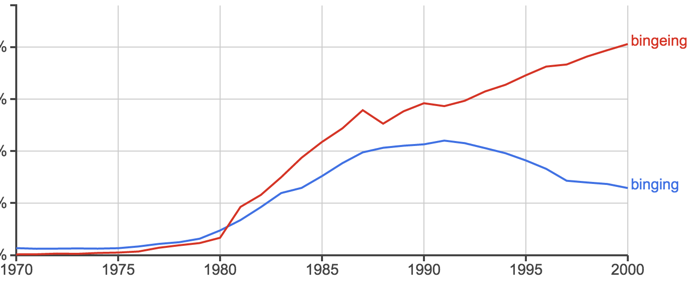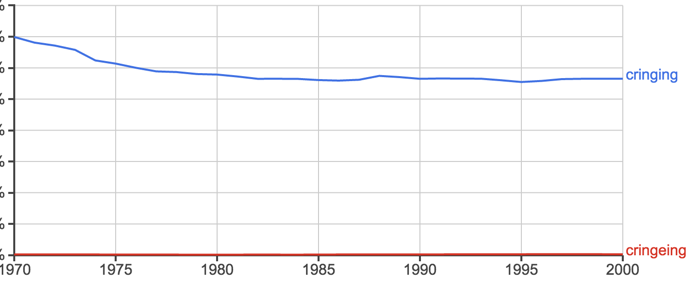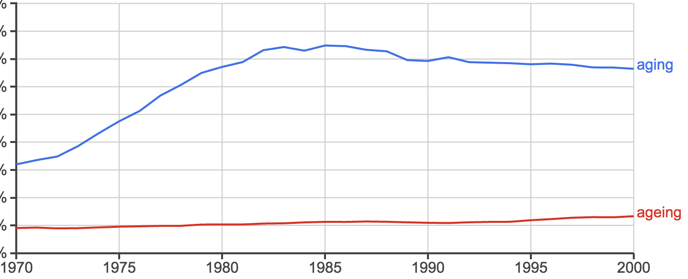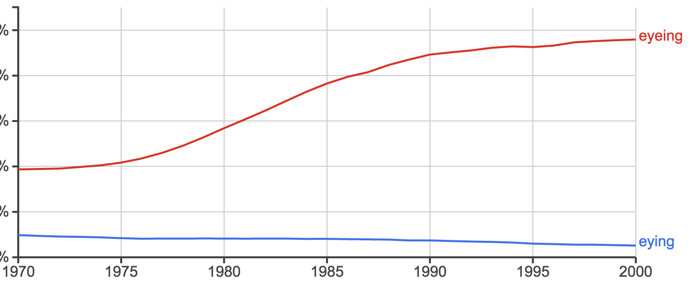Ask Language Log: bingeing, *cringeing
« previous post | next post »
Heath Mayhew writes:
The other day, one of my friends asked how to spell bingeing. Quickly, we all chimed in that it clearly couldn't be "binging". I didn't believe their conviction, so we looked it up in American Heritage 3rd and I lost. Below is a list of words we discovered to retain the "e" (which for me, looks so odd) and a list of words that lose it. Is there any unusual law that governs this? Any arcane rule that dictates whether or not one keeps or drops the "e"? We tried looking it up in Garner's American Modern Usage, but to no avail. It is a simply that words keep the 'e' in order to avoid confusing it with other words? I.e. singeing vs. singing.
binge – binging or bingeing
singe – singeing
cringe – cringing
tinge – tinging or tingeing
hinge – hinging
impinge – impinging
whinge – whingeing
(used The New Oxford American, 2nd)
I have no idea why binge → binging, bingeing but cringe→ cringing, *cringeing.
If indeed that's how it goes — which seems to be true:
 |
 |
So I'll leave it to readers to tell us what the rule — or more likely, the story — is.
Another perhaps-relevant pair:
 |
 |
John F said,
June 7, 2015 @ 7:41 am
Dunno, either. My best guess is to do with ambiguities, but English is full of those anyway.
Yerushalmi said,
June 7, 2015 @ 8:05 am
The first thing that leaps out at this layman is that cringing is the only one on the list in which the relevant syllable begins with a consonant cluster.
keri said,
June 7, 2015 @ 8:17 am
My first instinct is that "bing" and "ting" are words – onomatopoeia, but still not uncommon in my vocabulary. "Sing" is obviously a word. So the retained E in "bingeing", "tingeing", and "singeing" help differentiate them. The only one that doesn't match this theory is "whingeing", but it's also the least familiar word on the list to me, so I dunno.
fred said,
June 7, 2015 @ 8:20 am
"bingeing" may look odd, but it removes ambiguity. There's no ambiguity in "cringing", because I don't think there is a word "cring" with a form of "to cring".
Julian said,
June 7, 2015 @ 8:27 am
Keri's conjecture – that it is to distinguish from "sing", "bing" and "ting" – was my first thought too.
It seems "whing" is onomatopoeia too:
Google n-gram comparison: whinging/whingeing/whing
Yerushalmi said,
June 7, 2015 @ 8:37 am
Okay, I blame my comment above on not having gotten much sleep last night. So what if cringing has a consonant cluster? I'll go hide in the corner now.
Eric TF Bat said,
June 7, 2015 @ 8:40 am
I always thing "ageing" looks wrong too, and apparently it is wrong in US English but correct in Australian English. Presumably UK English (ie "Real English") matches the Australian convention; it usually does.
"Cringing", "hinging" and "tinging" definitely look wrong to me though, although "cringeing", "hingeing" and "tingeing" look wrong too.
I propose "crinjing", "hinjing", "tinjing", "sinjing", "whinjing" and for good measure "ajing". Who needs linguistic history?
Jason said,
June 7, 2015 @ 8:41 am
I agree with Keri, and it seems to me that Whingeing gets in under the same rule given that whinging could be a misspelling of winging, so by including the e, you maintain the soft G.
Jan said,
June 7, 2015 @ 9:25 am
Whingeing Poms and Whinging Poms (Britons who have emigrated there) are both used in the Australian colony.
Bloix said,
June 7, 2015 @ 9:28 am
Whinging is perhaps too similar to winging and needs to be differentiated. (Also, whingeing is British English – the American is whining – and the e looks like something Noah Webster would have done away with.)
Randy Alexander said,
June 7, 2015 @ 10:05 am
I'm with keri. "Whing" is listed in several dictionaries as onomatopoeia as well, so that would complete the pattern.
Mark Mandel said,
June 7, 2015 @ 10:07 am
Yes, I've been noticing this — i.e., not only aware of it, but thinking about it every time it pops up on me — for years. I agree most with @keri. Avoiding ambiguity is the main criterion, and *"whinging" is visually close enough to "winging" to trigger e-insertion.
I first noticed this phenomenon in an even weirder, if rarer, manifestation: a print ad, pre-Internet, for a singe-er, a device for… er, sew-ers… to singe the edges of fabrics so they wouldn't (un)ravel. (These lexical oddities seem to be pouring out of a tap!)
The durability of "binging" and the recency of "bing(e)ing" can be attributed to the recency of the concept and term "binge eating". I can't embed the Google ngram, but here are the five-year numbers. (Google presents them as percentages to ten decimal places. I'm dropping the decimal point, the leading zeroes, and the percent sign, so "3,563" represents "0.0000003563%".)
1975: 3,563
1980: 22,574
1985: 137,349
1990: 172,402
1995: 259,021
2000: 297,779
.
The construction has spread more recently to "binge watching", but that hasn't made it into Google Books's corpora yet.
Bob Ladd said,
June 7, 2015 @ 2:22 pm
NB lunge seems to give lunging even though lung is a word (albeit not a verb). And plunge certainly gives plunging, but does sponge give sponging or spongeing? Most dictionaries are surprisingly uninformative about this stuff. I was playing Scrabble the other day and there was a controversy about the -ing form of rue (as in He was ru(e)ing the day that…. We couldn't find an answer in either the big Webster's Third Unabridged or the two-volume small-print complete OED (and the player's ruing was allowed to stand).
Note also that there's a different solution to the ambiguity of G operating in dingy vs. dinghy.
Mark S said,
June 7, 2015 @ 3:01 pm
@Bob Ladd: According to Wiktionary ( http://en.wiktionary.org/wiki/rue#Verb ), it's either: "ruing" or "rueing".
hector said,
June 7, 2015 @ 3:36 pm
Perhaps a word is needed for "a word that always looks like it's misspelled, even when it's not."
Breffni said,
June 7, 2015 @ 4:27 pm
@Eric TF Bat: The first time I read "Beechwood Aging" on a Budweiser can, I thought "Aging? Is that somehow like agog?" It still catches me off-guard.
Ethan said,
June 7, 2015 @ 4:27 pm
@hector:
That would be 'misspelled' itself, wouldn't it :-)
Andrew (not the same one) said,
June 7, 2015 @ 4:40 pm
I remember reading the notorious transcript of a telephone conversation between Princess Diana and a friend, in which her friend says 'You haven't binged,' and she replies 'No, I haven't binged': and for a while I could not make this out at all, and was wondering why she would bing.
C said,
June 7, 2015 @ 5:10 pm
(But whinging is a little bit different to whining! We use both!)
Rubrick said,
June 7, 2015 @ 5:48 pm
These of course pale in the face of the truly unsolvable conundrum of "thundering and *lightninging".
Ben Zimmer said,
June 7, 2015 @ 6:38 pm
When I wrote about Microsoft's effort to "verb up" Bing (a la Google) in a 2010 Word Routes column, I noted that a hyphen seemed in order for Bing-ing to avoid the impression that the root word was binge.
And more recently, I wrote about the history of bing(e)ing and binge-Xing here and here.
Jeff W said,
June 7, 2015 @ 6:41 pm
Mark Mandel
Well, my thought was similar—I was thinking “auditorily close,” like when you’re reading the word to yourself. Without the “e” you might have a tendency to stumble over it, reading it first with a hard g and then correcting to a soft g.
And then, per Andrew (not the same one), maybe there’s a category in which a word like “binge” falls, where people think something like “bing” could be a word and we want to avoid the possibility that people are left wondering why someone would “bing” (or, really, what it all means). So over time the bingeing form takes precedence. Of course then we’d need a theory to explain why something like “bing” could be a word but not something like “cring” or “hing.”
Eric P Smith said,
June 7, 2015 @ 6:42 pm
I agree with other readers that the only reason to retain the ‘e’ is to distinguish the present participles of pairs of verbs like “sing” and “singe”. Moreover, as a Scot I have an additional data point. I would always spell the present participle of “hinge” as “hingeing” (Oxford Dictionaries gives both alternatives) because “hinging” to me looks like the present participle of the informal Scots “hing” for “hang”, as in “Ma tongue’s hingin oot wi thirst.”
Eric P Smith said,
June 7, 2015 @ 6:44 pm
@Eric TF Bat: 'crinjing' etc look wrong to me. What about 'crindging' by analogy with 'fridge'?
GeorgeW said,
June 7, 2015 @ 7:12 pm
Don't the /-ngeing/ words have an /I/ vowel as compared with an /i/ vowel?
sing/singing – singe/singeing
bing/binging – binge/bingeing
ting/tinging – tinge/tingeing
Eric P Smith said,
June 7, 2015 @ 9:02 pm
@GeorgeW: not quite [ɪ] – [i], but something approaching it in the speech of some people, including myself. I commented on the vowel difference between, on the one hand, “sing”, and, on the other hand “sin” (or “singe”) on the Language Log post on Symbols and signals on g-dropping in 2011.
phspaelti said,
June 7, 2015 @ 9:17 pm
I would suggest that frequency plays a role. The less frequent such a form is, the more likely it will retain the 'e' to make the 'ing' form closer to the base.
paul said,
June 8, 2015 @ 8:57 am
Rubrick said,
June 7, 2015 @ 5:48 pm
These of course pale in the face of the truly unsolvable conundrum of "thundering and *lightninging".
—
Hasn't this phenomenon been looked at already? I'm not a phonologist but I recall reading something about this. "Lightning" being one example of a class of words. E.g "a spritely walk" but *"walk spritelily", and other adjectives that end in "ly".
KevinM said,
June 8, 2015 @ 9:46 am
For most of these words (sing/singe aside), the clarity that the "e" brings often relates more to pronunciation than to meaning. The "ing" in the root word is a powerful miscue for a velar nasal(?) sound, which wouldn't be right. (Or rather, wouldn't sound right my mid-Atlantic US accent, though my Long Island relatives might disagree).
What I'm saying is that most of these examples don't involve any serious ambiguity. For example, what would "binging" be, unless overindulging in cherries, or the Microsoft search engine?
Terry Hunt said,
June 8, 2015 @ 12:01 pm
@ KevinM
". . .what would "binging" be, unless overindulging in cherries, or the Microsoft search engine?"
Possibly crooning in the manner of Mr Crosby?
Gregory Kusnick said,
June 8, 2015 @ 12:11 pm
KevinM: "what would 'binging' be"?
Dreaming of a white Christmas?
DWalker said,
June 8, 2015 @ 2:21 pm
Someone mentioned "whinging". I know about whining, when people whine, and I have seen "whinging" in writing but I have never understood the word "whinging", or "whingeing" for that matter. And I have never heard of the word "whing". Whine, yes, but not "whing".
Do people pronounce the "ing" in "whinging"? Is the g soft or hard? (Does "whinging" rhyme with "singing" and "pinging"? Do people actually say "whinj-ing"? I have never heard that.)
Bloix said,
June 8, 2015 @ 3:24 pm
Dwalker – "whinge" is British English for whine. In the UK (and Australia, etc) people whinge. And yes, they say whinj-ing.
E.g., "Chevron's tax whinge doesn't stack up" (headline on article about company's complaint that it pays too much in taxes).
http://www.smh.com.au/business/comment-and-analysis/chevrons-tax-whinge-doesnt-stack-up-20150607-ghik39.html
Seth said,
June 8, 2015 @ 7:42 pm
hahahahahahaha Oh man
Catanea said,
June 9, 2015 @ 2:12 am
As I am not in a spelling bee, I would use the e in every case. Somewhat often I see "stingy" in novels, and wonder whether it means "like a bee" or "like Jack Benny". Stingey. Yes. I prefer to spare the reader those moments of hesitation, even if I introduce a new hesitation about "is that spellt right".
Breffni said,
June 9, 2015 @ 3:33 am
@Bloix: "'whinge' is British English for whine."
As C pointed out further up, it's not that simple. They're both used (sometimes together: "whingeing and whining"), but although there's a lot of overlap in the various senses, they're not fully interchangeable. A dog or an electric motor can whine, but not whinge.
I think that's because literal whining is a tone of voice, while literal whingeing is crying: the kind of low-intensity, importunate crying that tired toddlers do. But OED doesn't back me up on the "crying" part, so that might just be a notion of my own.
C said,
June 9, 2015 @ 4:47 am
I think whing(e)ing is the complaining aspect (complaining more than others think one should) and whining is the aural aspect (dogs, engines etc.). You can whinge in a whin(e)y voice. Presumably, if you're saying anything in a whin(e)y voice, you're also whing(e)ing, so whining most likely covers both aspects, but you could whinge without being whin(e)y. I would have thought that adults whinge about the weather or their jobs and toddlers whine, well, I guess they do both.
Hoop said,
June 10, 2015 @ 3:21 pm
To me it looks like a case of where word frequency is important. Because some words are more commonly used such as "cringe", they will lose the "e" when adding "ing". But on the other hand when using a word such as "tinge" which is less frequent, the "e" is maintained. I don't know for sure if this is what is happening, but linguistically it's quite possible that this is the case.
Tiger Webb said,
June 10, 2015 @ 7:26 pm
There's also swingeing, discussion of which concluded it could be tied to word frequency and ambiguity e.g. 'this is a swingeing party, Sue!'